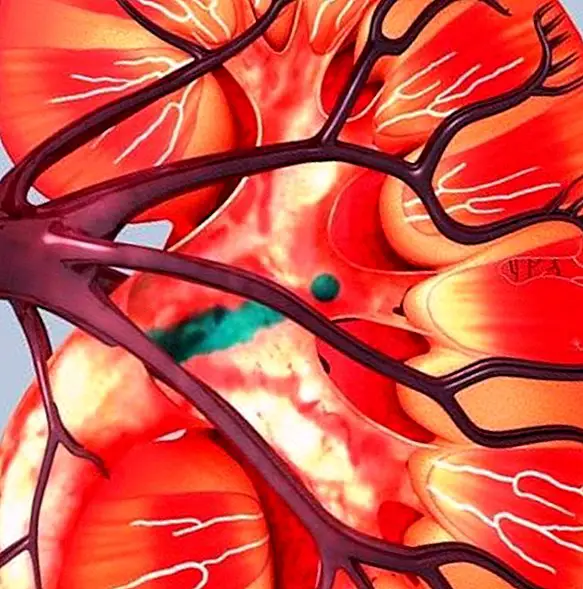What are the preventable causes of colon cancer and how to prevent it
It is estimated that about 140,000 new cases are diagnosed each year in the United States. Colorectal cancer, among which is the colon cancer and the rectal cancer. While, in our country, colon cancer is considered one of the malignant tumors with the highest incidence, with figures ranging between 28,500 and 33,800 cases each year, according to data offered by the AECC (Spanish Association Against Cancer). Cancer).
It is, as they warn, a type of malignant tumor whose incidence is increasing alarmingly especially in Western and developed countries, while in Spain the survival at 5 years after diagnosis is 64% (somewhat higher than the average European). However, is a cancer whose cure rate is high if it is detected early, mainly because it tends to take a long time to develop. 
Colon cancer is a disease that usually appears on an existing polyp in the colon mucosa., which for different reasons evolves into a malignant tumor. Usually the malignant cells are located in the longest part of the large intestine, as well as in the intermediate portion.
As you surely know, the colon is the place where the stool is stored before being expelled to the outside throughout the year. That is, it accumulates waste substances, so it becomes a place that is certainly conducive to the appearance of a malignant tumor.
It is a type of cancer that usually appears after the age of 40, so that its incidence increases as years go by. For this reason, there is a growing number of experts requesting that early detection tests be carried out at younger ages, instead of starting at 50-55 years of age.
Among the most commonly used tests for early detection, the American Cancer Society advises performing a CT colonography every 5 years, a colonoscopy every 10 years, a barium enema with double contrast every 5 years, or a flexible sigmoidoscopy test for 5 years. years.
On the other hand, there are other tests considered equally effective as a colonoscopy, such as the fecal occult blood test or the fecal immunochemical test.
What are the main causes of colon cancer that can be prevented?
As they have already seen inmunerables scientific studies, as it happens also with other types of cancers but in colon cancer with higher incidence, Colorectal cancer is closely related to the lifestyle and diet that we follow throughout our lives. 
Thus there are some causes that can help prevent colon cancer. How? Very simple: changing certain habits, improving our lifestyle and taking care of the food that we follow every day.
Control overweight
Did you know excess weight is related to colon cancer? In fact, it is known that a higher body mass index is strongly associated with a higher risk of developing colorectal cancer.
Apparently, abdominal obesity due to the distribution of fat in the body is an important factor.
It is treated as we see a cause easily avoidable and preventable. It is enough to change our diet especially if we follow an unbalanced and unhealthy diet (that is, we consume foods with a high content of fats and sugars), and opt for healthy, fresh and natural foods. These foods include fruits, vegetables and vegetables, being rich in fiber.
Avoid constipation
The constipation It is also a cause related to colon cancer. We must bear in mind that the colon is, together with the rectum, the place where feces are stored precisely before being expelled to the outside through the anus. 
Therefore, it is important to reduce the accumulation time of feces in the large intestine, following a varied and balanced diet that helps and improves intestinal transit. A good option is consume foods rich in fiber, such as whole grains, fresh fruits and vegetables, as well as nuts and legumes.
Oats, barley, rye and germ and wheat bran stand out among the cereals. Also nuts like almonds, hazelnuts and walnuts. On the other hand, other foods such as lentils, beans, peas and flax seeds stand out.
Eliminates sausages and decreases red meat
The intimate relationship between the usual consumption of sausages, cold meats (processed meats) and red meats with colorectal cancer is becoming clearer, increasing the risk and the incidence the greater and the more excessive its consumption.
This was announced by the IARC (International Center for Cancer Research), which recently published a report that considers processed meat as "carcinogenic to humans" and red meat as "probably carcinogenic to humans" .
Move and avoid physical inactivity
Following a sedentary lifestyle leads to the appearance of colon cancer. In fact, it is estimated that the probability of suffering from it increases by 8% when there is an increase of 2 hours of sedentary life per day. 
The same goes for the sedentary work, which can increase the risk of certain chronic diseases in the long term, among which colorectal cancer would be found.
The solution? Although it is true that sedentary work is related to the risk of cancer despite the fact that during free time physical exercise is practiced, We must avoid sedentary lifestyle, practicing sports on a regular basis every day.
Dietary advice for the prevention of colon cancer
- Eat foods rich in fiber: foods rich in fiber are essential - and fundamental - in the prevention of this type of cancer, given that it is a nutrient that facilitates intestinal transit and the expulsion of waste. In fact, they help because they reduce the time in which the waste (rich in toxic agents) is in contact with the intestinal wall. It also absorbs bile acids, which prevents them from acting on the bacteria to produce fecapentans (carcinogenic substances that form once the food has decomposed inside the colon). That is why it is important consume at least 25 grams of fiber per day.
- Eat foods rich in calcium: calcium is a mineral whose daily consumption helps to have a lower incidence of colorectal cancer, since controls the multiplication of epithelial cells lining the colon, which when they proliferate increases the risk of suffering it. Opt for dairy products and derivatives, as well as vegetables, legumes, soybeans, nuts and fish.
- Essential and protective vitamins: Vitamin C (blocks the formation of nitrosamines in the stomach, carcinogenic substances that are formed from nitrites and nitrates), vitamin D (eliminates the formation of new blood vessels that feed the growth of tumors) and the vitamin E (besides being an antioxidant, it blocks the formation of carcinogenic substances in our body).
Causes that can not be prevented
However, there are certain causes that can not be prevented, especially in the presence of familial colonic polyposis (affects 1% of colon cancers, appears during adolescence and causes multiple polyps in the clone and rectum, as a consequence of a mutation of the APC gene that is transmitted from parents to children), or the hereditary nonpolyposis colorectal cancer (It accounts for 5% of tumors and occurs in patients who do not have polyps).
Bibliography:
- Egeberg R, Olsen A, Christensen J, Halkjær J, Jakobsen MU, Overvad K, Tjønneland A. Associations between red meat and risks for colon and rectal cancer depend on the type of red meat consumed. J Nutr. 2013 Apr; 143 (4): 464-72. doi: 10.3945 / jn.112.168799. Available at: //academic.oup.com/jn/article/143/4/464/4571554
- Ugo Testa, Elvira Pelosi, Germana Castelli. Colorectal Cancer: Genetic Abnormalities, Tumor Progression, Tumor Heterogeneity, Clonal Evolution and Tumor-Initiating Cells. Med Sci (Basel) 2018 Jun; 6 (2): 31. doi: 10.3390 / medsci6020031. Available at: //www.ncbi.nlm.nih.gov/pmc/articles/PMC6024750/
- Drew JE. Molecular mechanisms linking adipokines to obesity-related colon cancer: focus on leptin. Proc Nutr Soc. 2012 Feb; 71 (1): 175-80. doi: 10.1017 / S0029665111003259. Available at: //doi.org/10.1017/S0029665111003259
- Batty D, Thune I. Does physical activity prevent cancer? Evidence suggests protection against colon cancer and probably breast cancer. BMJ. 2000 Dec 9; 321 (7274): 1424-5. Available at: //www.ncbi.nlm.nih.gov/pmc/articles/PMC1119154/
Last revision: 11/29/2018 - 9:47 This article is published for informational purposes only. It can not and should not replace the consultation with a Physician. We advise you to consult your Trusted Doctor. ThemesColon cancer


